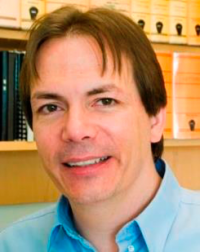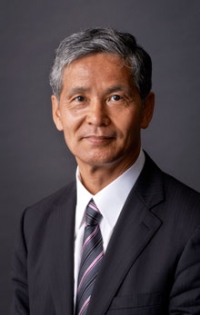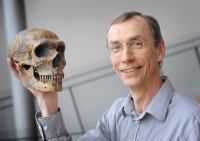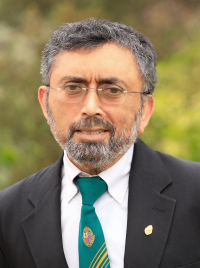Sequencing the Chimpanzee Genome: What Have We Learned?
Biographical Sketches: Speakers
Agency for Science, Technology and Research (A*STAR)
Nobel Laureate and Salk Distinguished Professor Emeritus Sydney Brenner passed away on April 5, 2019, in Singapore at the age of 92. Over the course of six decades, Brenner shaped the modern understanding of the genetic code.
“We at Salk join countless other scientists and researchers around the world in mourning the passing of Sydney Brenner,” says Salk President Rusty Gage, holder of the Vi and John Adler Chair. “Along with raising the field of molecular biology to maturity, Sydney was a generous and dedicated mentor, colleague and friend. He was an inspiration to generations of scientists and he will be greatly missed.”
“We all owe much to Sydney. With his passing we have lost a great scientist and a good friend,” says Salk Professor Terrence Sejnowski, holder of the Francis Crick Chair.
“Sydney Brenner was a luminary, a ‘once-in-a-lifetime’ scientist. We at the Salk Institute were entertained and enthralled by his wit and wisdom,” adds Salk Professor Ronald Evans, holder of the March of Dimes Chair. “His research inspired my career. He will be remembered in perpetuity for his brilliant discoveries that ushered in a new era of science and a new generation of scientists.”
Brenner joined the Institute as a Distinguished Professor in 2000 and was awarded the Nobel Prize in Physiology or Medicine shortly afterward in 2002, along with H. Robert Horvitz and John Sulston, “for their discoveries concerning genetic regulation of organ development and programmed cell death,” according to The Nobel Foundation.
Born in Germiston, South Africa, in 1927, Brenner earned degrees in medicine and science in 1947 from Johannesburg’s University of Witwatersrand before moving to Oxford University in 1952 to pursue his PhD in physical chemistry. While at Oxford he became engrossed in DNA and developmental genetics research. He joined the University of Cambridge in 1956 and shared an office with future Nobel Laureate Francis Crick for nearly 20 years.
In partnership with Crick, in 1961 Brenner demonstrated that the genetic code for proteins uses a series of three nucleotides to code for a single amino acid. He further showed that certain combinations of triplet nucleotides called “nonsense” or “stop” codons (a phrase he coined) halt protein creation during translation.
Around this time, he also co-discovered the existence of messenger RNA (mRNA), one of the molecular intermediates between DNA and proteins, and demonstrated that the nucleotide sequence of mRNA determines the order of amino acids in proteins. This work led to his first Lasker Award in Basic Medical Research; he later received a second Lasker Award in honor of his outstanding lifetime achievements.
In 1976 Crick left Cambridge to join the Salk Institute, and Brenner joined him once again in 1981 as a nonresident fellow. In 1992 Brenner was appointed to the Scripps Research Institute, located less than a mile from Salk. Brenner and Crick were reunited at Salk in 2000. In 2001, Brenner co-authored an autobiography titled My Life in Science.
Brenner, Horvitz and Sulston received the Nobel Prize in 2002 for their pioneering research using the translucent microscopic worm Caenorhabditis elegans, as a model system for linking genetics, cell division, organ formation and cell death. Their research laid the groundwork for making C. elegans a major model organism in research, and “shed new light on the pathogenesis of many diseases,” according to The Nobel Foundation. This tiny worm became the first animal to have its genome sequenced and remains the only animal to have its full “neuronal map” or connectome constructed.
Today, thousands of researchers use C. elegans for their research, and Brenner was honored in 2007 when a closely related nematode was named after him--C. brenneri.
“Sydney was a dear friend and uber-mentor,” says Gene Yeo, a former researcher at Salk and a professor at UC San Diego who worked with Brenner (and whose father, Philip Yeo, developed with Brenner a number of scientific institutes in Singapore). “He was an inspiring scientist who thought bureaucrats and borders were often hurdles to great science and showed us how to mentor the young to have a healthy disrespect for authority and the impossible. We will miss him terribly.”
In 1996, Brenner founded The Molecular Sciences Institute in Berkeley, California. Outside of the United States, Brenner was the founding president of the Okinawa Institute of Science and Technology in Japan and helped to bring biotechnology in Singapore onto the world stage. For over 30 years he pushed for Singapore to establish a major research institute. In 1985, his dreams came to fruition and the Institute of Molecular and Cell Biology (IMCB) was launched. Later, he helped to establish the A*Star (Agency for Science, Technology and Research) Graduate Academy, to help Singapore train new scientists and engineers for the future.
His successes in Singapore led to him become the first honorary citizen of Singapore in 2003. He remained scientific adviser to the chairman of A*Star and head of its Molecular Engineering Laboratory until his passing.
Brenner is survived by his children Belinda, Carla and Stefan.
From the Salk Institute website: https://www.salk.edu/news-release/salk-mourns-the-passing-of-nobel-laureate-and-salk-distinguished-professor-emeritus-sydney-brenner/
Cornell University
Andrew G. Clark is Professor of Population Genetics in the Department of Molecular Biology and Genetics. He received a B.S. in Biology and Applied Mathematics at Brown University in 1976, and a Ph.D. in Population Genetics at Stanford University in 1980. He did postdoctoral work at Arizona State University and the University of Aarhus, Denmark, and a sabbatical at the University of California at Davis. Prior to joining the Cornell faculty in 2002, he was a professor in the Department of Biology at Penn State University. Dr. Clark's research focuses on the genetic basis of adaptive variation in natural populations, with emphasis on quantitative modeling of phenotypes as networks of interacting genes. Dr. Clark has been active in genomics research and has been a frequent consultant with Celera Genomics since April 1999. He was elected Fellow of the American Association for the Advancement of Science in 1994, and serves on review panels for the NIH, NSF, and the Max Planck Society. Dr. Clark's research has been supported by the National Institutes of Health, the National Science Foundation, the Alfred P. Sloan Foundation, NATO, and the Marsden Fund. He served as President of the Society of Molecular Biology and Evolution, and is on the Council of the Genetics Society of America. Dr. Clark is a member of the graduate field of Genetics and Development, and Ecology and Evolutionary Biology. He will be teaching courses in the Human Genetics and Genomics and Advanced Population Genetics.
University of Washington School of Medicine
Evan Eichler, PhD, is a Professor and Howard Hughes Medical Institute Investigator in the Department of Genome Sciences, University of Washington School of Medicine, and serves on the CARTA External Advisory Board. He graduated with a B.Sc. Honours degree in Biology from the University of Saskatchewan, Canada, in 1990. He received his PhD in 1995 from the Department of Molecular and Human Genetics at Baylor College of Medicine, Houston, Texas. After a Hollaender postdoctoral fellowship at Lawrence Livermore National Laboratory, he joined the faculty of Case Western Reserve University in 1997 and later the University of Washington in 2004. He was a March of Dimes Basil O’Connor Scholar (1998–2001), appointed as an HHMI Investigator (2005), awarded an AAAS Fellowship (2006) and the American Society of Human Genetics Curt Stern Award (2008), and elected to the National Academy of Sciences (2012) and the National Academy of Medicine (2017). He is an editor of Genome Research and has served on various scientific advisory boards for both the NIH and NSF. His research group provided the first genome-wide view of segmental duplications within human and other primate genomes and he is a leader in an effort to identify and sequence normal and disease-causing structural variation in the human genome. The long-term goal of his research is to understand the evolution and mechanisms of recent gene duplication and its relationship to copy number variation and human disease with a specific emphasis on the genetic architecture of autism and neurodevelopmental delay.
UC San Diego
Pascal Gagneux is CARTA's Executive Co-Director, a Professor of Pathology and Anthropology, and the Department Chair of Anthropology at UC San Diego. He is interested in the evolutionary mechanisms responsible for generating and maintaining primate molecular diversity. The Gagneux laboratory studies cell-surface molecules in closely related primates species. His focus is on glycans, the oligosaccharides attached to glycolipids and glycoproteins of the surfaces of every cell and also secreted into the extra-cellular matrix. Gagneux's laboratory is exploring the roles of molecular diversity in protecting populations from pathogens as well as potential consequences for reproductive compatibility. Dr. Gagneux’s interest is in how glycan evolution is shaped by constraints from endogenous biochemistry and exogenous, pathogen-mediated natural selection, but could also have consequences for sexual selection. Dr. Gagneux has studied the behavioral ecology of wild chimpanzees in the Taï Forest, Ivory Coast, population genetics of West African chimpanzees, and differences in sialic acid biology between humans and great apes with special consideration of their differing pathogen regimes. In 2011, while Associate Director of CARTA, Dr. Gagneux helped to establish a graduate specialization in Anthropogeny at UC San Diego. This wholly unique graduate specialization is offered through eight participating graduate programs in the social and natural sciences at UC San Diego.
University of Washington School of Medicine
Mary-Claire King is American Cancer Society Research Professor at the University of Washington in Seattle. She received her B.A. in Mathematics from Carleton College and her Ph.D. in Genetics from University of California at Berkeley with the late Allan Wilson. Her dissertation (published in Science in 1975) was the demonstration that humans and chimpanzees are 99% identical at the level of structural genes, yet sufficiently diverged in morphology to be classified in different families. King and Wilson postulated that critical changes in human evolution were likely due to regulatory changes in the timing and level of gene expression.
Subsequently, as Professor of Genetics at UC Berkeley in the Department of Molecular and Cell Biology and the School of Public Health, Dr. King was the first to prove that breast cancer is inherited in some families. She used linkage analysis of high risk families to prove the existence of the gene she names BRCA1. The characterization of inherited breast cancer remains her primary research focus. Her other research interests include inherited deafness, systemic lupus erythematosus, human genetic diversity and evolution, and the application of DNA sequencing to human rights problems. At the University of Washington since 1996, she is ACS Professor in the Departments of Medicine and Genome Sciences.
Dr. King has served on the National Commission on Breast Cancer of the Presidents Cancer Panel, the National Academy of Sciences' Committee on Science, Engineering, and Public Policy (COSEPUP), multiple National Cancer Institute councils and planning groups, three NIH study sections, the Council of the Institute of Medicine, the Advisory Committee for the NIH Office for Research on Women's Health, the Council of the NIH Fogarty International Center, National Academy of Sciences' Committees on the Use of DNA in Forensics and on the Development of the DOD Breast Cancer Research Program, and as consultant to the Commission on the Disappearance of Persons of the Republic of Argentina. Her lab carried out DNA identifications for the United Nations War Crimes Tribunal.
Dr. King has been elected to Phi Beta Kappa and Sigma Xi, as a Fellow of the American Association for the Advancement of Science, as a member of the Institute of Medicine, and to the American Academy of Arts and Sciences.
Northwest University, Xi'an, China
Tetsuro Matsuzawa is a former Director of the Primate Research Institute of Kyoto University, Japan. He is currently the Academic Advisor of Chubu Gakuin University, Japan, the Visitor in Psychology at California Institute of Technology, the USA, and the Invited professor of Northwest University in Xi'an, China. Matsuzawa studies chimpanzee intelligence both in the laboratory and in the wild. His laboratory work is known as "Ai project". Since 1977, it focuses on the language-like skills, the concept of number, and the working memory: The participants are a 47-year-old female chimpanzee named Ai, and her 24 year-old son named Ayumu, and others live in the community of 11 chimpanzees including 3 generations. The working memory of young chimpanzees can be better than humans (https://www.youtube.com/watch?v=ktkjUjcZid0). The fact led him to the "Cognitive Tradeoff Hypothesis". In his parallel effort, Matsuzawa has also studied wild chimpanzees at Bossou and Nimba, Republic of Guinea, West Africa, since 1986. The Bossou chimpanzees are known to use a pair of stones as hammer and anvil to crack open oil-palm nuts. His long-term research revealed the topics like the 100% lateralization of handedness of using a stone hammer, the critical period of learning nut-cracking at the age 3 to 5, and the social learning called "Education by Master-Apprenticeship", grand-mothering in chimpanzees, etc. Matsuzawa tries to synthesize the field work and the laboratory work to understand the mind of chimpanzees, our evolutionary neighbors. He has received several prizes including the Purple Ribbon Medal of Honor, the Jane Goodall Award, Person of Cultural Merit, Japan. He has published many articles and books such as Primate Origins of Human Cognition and Behavior (Springer, 2001), Cognitive Development in Chimpanzees (Springer, 2006), The Mind of the Chimpanzee (Chicago University Press, 2010), and Chimpanzees of Bossou and Nimba (Springer, 2011).
Professor Emeritus, University of Washington
Maynard Olson is a Professor Emeritus of Medicine and Genome Sciences at the University of Washington. His research expertise is in the study of natural genetic variation in humans and bacteria. Olson served on the National Research Council Committees on Mapping and Sequencing the Human Genome and Toward Precision Medicine, the Advisory Council of the National Human Genome Research Institute, and numerous other groups that shaped policy for the Human Genome Project. He is presently involved in writing projects that explore the interface between science and the humanities.
Max Planck Institute for Evolutionary Anthropology
Svante Pääbo is the Director of the Department of Genetics at the Max Planck Institute for Evolutionary Anthropology. Pääbo has developed techniques that allow DNA sequences from archaeological and paleontological remains to be determined. This has allowed the reconstruction of the Neandertal genome and the discovery of Denisovans, a previously unknown group in Asia related to Neandertals. He also works on the evolution of genetic features that may underlie aspects of traits specific to humans. Pääbo is the 2022 recipient of the Nobel Prize in Physiology or Medicine “for his discoveries concerning the genomes of extinct hominins and human evolution.”
The University of Stirling; Centre International de Recherches Médicales de Franceville (CIRMF)
Caroline Tutin is affiliated to the Centre International de Recherches Médicales de Franceville (CIRMF), Gabon and to the Department of Biological Sciences at the University of Stirling, Scotland. After 30 years of full-time field research on the ecology and behaviour of wild chimpanzees and gorillas, her main focus is now on conservation. She conducted doctoral research on chimpanzee reproductive strategies at the Gombe Stream National Park in Tanzania, and post-doctoral studies of chimpanzee ecology in Senegal, and in 1980, was invited by CIRMF to conduct a nation-wide census of the chimpanzees and gorillas of Gabon. The census revealed the potential of Gabon for conservation of great apes and led to the establishment of a field station in the Lopé Reserve. Research conducted at Lopé over the past 20 years has documented the ecology of many species of large mammals, notably gorillas, chimpanzees and elephants, and elucidated the dynamics of tropical forest plant and animal communities. As Director of this centre from 1983 to 2001, Dr Tutin developed protocols for long-term monitoring of populations of gorillas, chimpanzees and their tropical rain forest habitat as well as training programmes for national and international students. Numerous national and international collaborations have allowed data on the natural history of the chimpanzees and gorillas at Lopé to contribute to developing Gabon’s conservation strategy and the gazetting of a network of 13 National Parks in 2002. Dr. Tutin is a member of the IUCN-SSC Primate Specialist Group and of the Great Ape Advisory Panel and has advised governments, international agencies and non-governmental organisations on policy and the implementation of conservation projects.
UC San Diego School of Medicine
Ajit Varki is a Distinguished Professor of Medicine and Cellular & Molecular Medicine, Emeritus Co-Director of CARTA, Emeritus Co-Director of the Glycobiology Research and Training Center at UC San Diego, and Adjunct Professor at the Salk Institute. He received basic training in physiology, medicine, biology, and biochemistry at the Christian Medical College (CMC), Vellore, The University of Nebraska, and Washington University in St. Louis. He also has formal training and board certification in internal medicine, hematology, and oncology. Varki is the executive editor of Essentials of Glycobiology (Cold Spring Harbor Press, 4th Edition, 2022) and is recipient of a MERIT award from the NIH, and an American Cancer Society Faculty Research Award. Honorific elections include the American Academy of Arts and Sciences, the National Academy of Medicine, the American Society for Clinical Investigation, and the Association of American Physicians. He is also recipient of the three highest honors in his field, the Karl Meyer Award of the Society for Glycobiology, the International Glycoconjugate Organization Award and the Rosalind Kornfeld Award for Lifetime Achievement in Glycobiology. He is recognized for creating the first major open access research journal (J. Clin. Invest., 1996) as well as the first major open access textbook (Essentials of Glycobiology, 2009). He was honored with the Old Cottonian of Eminence Award at the 150th Anniversary of Bishop Cotton Boys School, Bangalore, India, (2015) as well as a Distinguished Faculty Medal and Oration at his medical school alma mater, CMC, Vellore. Significant past appointments include: Co-Head, UC San Diego Division of Hematology-Oncology; President of the Society for Glycobiology; Editor-in-Chief of the Journal of Clinical Investigation; Interim Director of the UC San Diego Cancer Center, President of the American Society for Clinical Investigation, and UC San Diego Associate Dean for Physician-Scientist Training. Varki's research interests are focused on a family of cell surface sugars called sialic acids, and their roles in biology, evolution and disease. Currently, active projects are relevant to the roles of sialic acids in microbial infectivity, the regulation of the immune response, the progression and spread of tumors, aging, and unique aspects of human evolution. His group is particularly intrigued to find multiple interrelated differences in sialic acid biology between humans and our closest evolutionary cousins, the "great apes." These differences are a signature of the events that occurred during the last few million years of human evolution, and appear to be relevant to understanding several aspects of the current human condition, both in health and disease. Varki’s book, Denial (Twelve, Hachette Books, 2013), explores a novel "Mind Over Reality Transition” (MORT) theory that denying reality and personal mortality was a key step in allowing the emergence of a full theory of mind, and in the origin of our species.
University of Washington School of Medicine
Robert H. Waterston is William Gates III Chair and Professor in the Department of Genome Sciences at the University of Washington School of Medicine in Seattle. He formerly served as chair of the Department of Genetics at Washington University School of Medicine in St. Louis, where he established and directed the school’s Genome Sequencing Center until 2002. Dr. Waterston earned an engineering degree from Princeton University in 1965, followed by M.D. and Ph.D. degrees from the University of Chicago in 1972. He interned at Children’s Hospital Medical Center in Boston and was twice a postdoctoral fellow in biology at the Medical Research Council Laboratory of Molecular Biology in Cambridge, England. One of the first disciples of Sydney Brenner in Cambridge, Dr. Waterston established an independent laboratory that helped establish the nematode Caenorhabditis elegans as a powerful experimental organism. Following his return to Cambridge to work with John Sulston in 1985, Dr. Waterston’s work has increasingly concentrated on genome mapping and sequencing. The elucidation of the nematode genome, announced in 1998, represented the first complete set of genes for any animal. Building on the techniques, tools and information developed in working with model organisms, the “working draft” of the human genome map and sequence was published in 2001. He is now pursuing methods of understanding how the information stored in the genome is interpreted to enable life. Using comparative sequence analysis, his lab will explore the ways comparative analysis can illuminate the function of the human genome, in order to use human polymorphism to aid in the assignment of likely gene function. Dr. Waterston received American Heart Association Established Investigator Awards from 1980-85 and a John Simon Guggenheim Fellowship in 1985-86. He has served as a member of several National Institutes of Health study sections and the Advisory Council of the NIH National Human Genome Research Institute. In 2000, he was elected to the National Academy of Sciences. In 2001 he received the Beadle Medal from the Genetics Society of America and the City of Medicine Award and was elected to membership in the Institute of Medicine of the NAS. In 2002, he was awarded the Dan David Prize, the Gairdner Award and the Sloan Award. He is currently serving as a member of the Council of the Institute of Medicine, liaison to the National Cancer Policy Board for the IOM Council, and member of the National Academies Committee on Intellectual Property in Genomic and Protein Research and Innovation.











